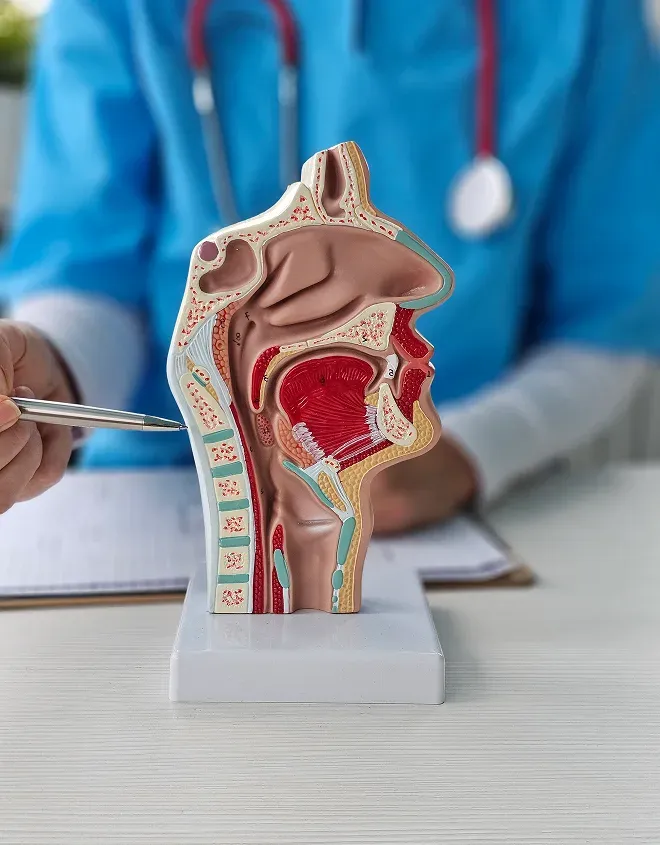What is the Thyroid? Understanding its Role in Your Health

by Dr. W. Rizvi
2 Sept 2025

You might have heard about the thyroid, but what is the thyroid, and how does it work? The thyroid is a small, butterfly-shaped gland at the front of your neck, directly beneath the Adam's apple. Despite its small size, this gland is crucial in regulating various vital bodily processes. It is part of the endocrine system and releases hormones into the bloodstream to support energy levels, growth, metabolism, and other body processes. Even though it usually operates in the background in silence, any imbalance in its activity can seriously affect mental well-being and physical health. Thyroxine (T4) and triiodothyronine (T3) are the two main chemical substances the thyroid produces. They are essential for regulating how your body uses energy.

Imagine your body as a machine; the thyroid hormones determine how fast or slow that machine operates. These hormones control essential bodily functions, including heart rate regulation, managing energy balance in your cells, and how you burn calories. Hyperthyroidism is a condition in which your thyroid produces too much hormone, which speeds up your metabolism and causes symptoms like anxiety, weight loss, and a fast heartbeat. On the flip side, when hormone production drops too low, it leads to hypothyroidism, slowing metabolism down and resulting in fatigue, weight gain, and mood changes.
The Significance of the Thyroid Gland for Growth, Metabolism, Heart Health, Emotions, and Temperature Regulation
To gain a better understanding, let's concentrate on the importance of the thyroid gland. The thyroid is a tiny yet powerful gland that controls several essential bodily processes. One of its prominent roles is to regulate metabolism, which affects how efficiently your body uses energy.
One of its key responsibilities is managing metabolism, which determines how effectively your body uses energy. This process impacts everything from how quickly you burn calories to how energetic or sluggish you feel throughout the day. This process influences your overall energy levels and calorie burn rate.

When your thyroid is healthy, you feel energized and balanced. It can, however, cause feelings of exhaustion, sluggishness, or restlessness if it becomes too active or too inactive. Besides controlling energy, thyroid is essential for growth and development, especially in young children. It guarantees that physical growth proceeds healthily and promotes brain development. Thyroid hormone deficiency in early life can cause severe delays in mental and physical development. For this reason, a child's healthy growth and cognitive development depend on the early identification and treatment of thyroid problems.
Beyond growth, the thyroid helps maintain heart and digestive system health. It keeps your heartbeat steady and supports proper digestion. Imbalances in thyroid hormones can result in irregular heartbeats or digestive problems, such as changes in appetite or difficulty breaking down food. These disturbances may cause symptoms like gastrointestinal distress, weight fluctuations, or an elevated heart rate if treatment is not received.
Lastly, the thyroid affects mental and emotional well-being. An underactive thyroid might lead to depression, low motivation, and trouble concentrating. On the other hand, anxiety, restlessness, or trouble sleeping could result from an overactive thyroid. It also aids in controlling body temperature, which is why thyroid conditions can cause abnormally high or low body temperatures. Both physical comfort and mental clarity depend on thyroid health maintenance.
The Pituitary Gland: How the Brain's Master Controller Regulates Thyroid Function
The pituitary gland works as the thyroid's manager, ensuring the right balance of hormones in the body. It produces the thyroid-stimulating hormone (TSH), which signals the thyroid to either increase or decrease hormone production based on the body's needs. When hormone levels drop too low, the pituitary releases more TSH to stimulate the thyroid into producing more hormones. On the other hand, the pituitary lowers TSH production in response to excessively elevated hormone levels, which slows down thyroid activity. This feedback loop maintains the stability of vital processes like energy regulation, metabolism, and body temperature.
What Happens When Thyroid Malfunctions? Common Issues:
When the thyroid gland stops working as it should, it can lead to various health problems, some subtle, others more obvious and potentially serious. Since the thyroid functions include maintaining metabolism, heart rate, and energy levels, any disruption in its activity affects multiple systems in the body. One common issue is hypothyroidism, where the thyroid doesn't produce enough hormones. Moreover, it slows the body's metabolic processes, leaving you sluggish and constantly tired. Many people with this condition experience weight gain, even if they haven't changed their eating habits, and often feel cold or struggle with dry skin and brittle hair. Memory issues and feelings of depression can also be signs that your thyroid isn't producing enough hormones. Iodine deficiency, autoimmune disorders like Hashimoto's thyroiditis, and even specific drugs are among the most frequent causes.
On the other hand, hyperthyroidism occurs when the thyroid overproduces more hormones than the body requires. Your metabolism may increase as a result, leading to symptoms like anxiety, excessive perspiration, a racing heart, and abrupt weight loss. You might also find it hard to sleep or feel constantly restless. The leading cause of hyperthyroidism is usually Graves' disease, an autoimmune disorder. Still, it can also be triggered by thyroid inflammation or hormone-producing nodules. Another issue you might encounter is goiter (thyroid gland expansion). This condition is often caused by iodine deficiency or hormonal imbalances.

Gena Lee Nolin, actress and thyroid health advocate, emphasizes the widespread impact of thyroid disease: “I think people assume that having thyroid disease means you're older and overweight, but in reality, thyroid disease strikes at all ages and affects all sizes.”
Tips for Maintaining Thyroid Health: Prioritize Nutrient-Rich Foods
Taking care of your thyroid is essential for overall well-being. Proper nutrition, lifestyle habits, and regular medical monitoring can help keep your thyroid functioning smoothly. Certain nutrients are vital for optimal thyroid function, and including them in your diet can help prevent thyroid disorders:
- Iodine is the most critical mineral for thyroid health, as it is essential for producing thyroid hormones. Because the body cannot produce iodine alone, it must be obtained through food. Excellent sources of iodine include seafood (particularly seaweed), iodized salt, dairy products, and eggs. However, maintaining a proper balance is essential, especially for individuals with existing thyroid conditions such as Graves' disease, as too much or too little iodine can affect thyroid function.
- Selenium: This trace mineral helps activate thyroid hormones and protects the gland from damage caused by oxidative stress. Foods such as Brazil nuts, tuna, sardines, and eggs are excellent sources of selenium.
- Zinc: Zinc supports healthy thyroid hormone levels. Including oysters, beef, pumpkin seeds, and legumes in your meals can ensure you get enough of this vital nutrient.
- Thyroid health depends on a well-rounded, balanced diet. Leafy greens, berries, and foods high in antioxidants can help reduce inflammation, which may protect the thyroid from autoimmune attacks. Eat less processed food because it contains chemicals and additives that can interfere with thyroid function.
Conclusion
Since the thyroid regulates emotions, heart rate, metabolism, and energy levels, it is essential for general health. It could be time to examine your thyroid health if you're experiencing sudden changes in mood, unexplained weight fluctuations, or persistent fatigue. Most thyroid-related disorders can be successfully treated with the right medical attention, which will help you stay balanced, have more energy, and promote general health. A simple blood test can give vital information about the activity of your thyroid and assist in choosing the best course of action.
Contact your Endocrinologist today, Dr. W. Rizvi at R-endocrinology, to learn more about What is the Thyroid? Understanding its Role in Your Health.
Resource:
Managing Hair Loss: How Diet, Lifestyle, and Stress Impact Your Hair Health
Share This:
Disclaimer
*Please note that the information provided in the blogs and articles is intended for general informational purposes only and should not be considered medical advice. We strive to bring you the latest information about the endocrine world; however, we encourage you to seek individual medical advice and treatment options during your consultation with a qualified healthcare professional. *
